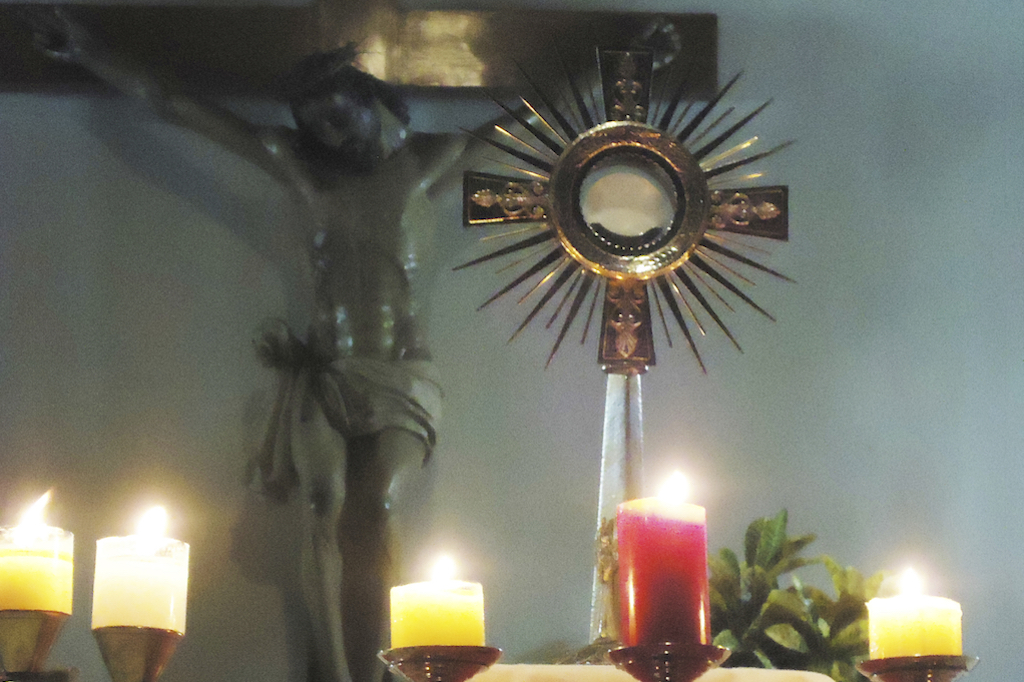This year, we celebrate the Solemnity of the Body and Blood of Christ (traditionally knows as Corpus Christi) on the final Sunday of May. Many parishes choose to process with the Eucharist – sometimes simply around the church or neighborhood, while others make longer treks. Regardless, this celebration makes known to all who see and hear a fundamental tenet of our faith: that Christ is present, Body, Blood, Soul and Divinity, in the Eucharist.
Of course, this seems a bit crazy. It’s understandable how this could be a stumbling block for so many. How possibly could Jesus Christ, Emmanuel, God-Made-Man, be “inside” that Host, that Chalice? Isn’t it just a piece of bread and some wine that we remember Jesus by? It’s just a reminder of Him and the Last Supper, right?
No.
It is not “just” a piece of bread and some wine, or a memory of a long ago event. How can we be assured of this? How do we Catholics know this to be true? Because Christ Himself told us.
In the Gospel of John, chapter 6, John tells of the miracle of the loaves and fishes. The vast crowd who came to hear Jesus’ preach were fed – astoundingly – with a very small amount of food. The next day, Jesus takes his disciples and gives them the teaching on the Bread of Life.
Jesus said to them, “I am the bread of life; whoever comes to me will never hunger, and whoever believes in me will never thirst. But I told you that although you have seen [me], you do not believe. Everything that the Father gives me will come to me, and I will not reject anyone who comes to me, because I came down from heaven not to do my own will but the will of the one who sent me. And this is the will of the one who sent me, that I should not lose anything of what he gave me, but that I should raise it [on] the last day. For this is the will of my Father, that everyone who sees the Son and believes in him may have eternal life, and I shall raise him [on] the last day.” (Jn. 6:35-40)
Now, the disciples were used to Jesus teaching in parables: the Kingdom of God is like, or it’s as if. But they could tell his tone was different here. They started squirming: How can this guy be bread? That’s not REALLY what He meant, is it?
And Jesus clarified:
I am the bread of life. Your ancestors ate the manna in the desert, but they died;this is the bread that comes down from heaven so that one may eat it and not die.I am the living bread that came down from heaven; whoever eats this bread will live forever; and the bread that I will give is my flesh for the life of the world.” (Jn: 6:48-51)
Well, that was it for some of the disciples. There was no doubting Jesus’ meaning: He wasn’t just saying “eat;” He was using the word for “gnaw.” He really meant eating His Body. And some of those disciples left. This was simply too outrageous.
Even today, these words of Christ are too outrageous for many Christians; they do not believe that Christ, at the Last Supper, fulfilled His words. We must, as Catholics, work to bring our Christian brothers and sisters into the fulness of faith. However, we cannot do that unless our own faith is formed. The Solemnity of the Body and Blood of Christ is an opportunity to deepen our own faith.
A few years ago, Pope Francis said this challenged us on the Solemnity of the Body and Blood of Christ:
[I]n adoring Christ who is really present in the Eucharist: do I let myself be transformed by him? Do I let the Lord who gives himself to me, guide me to going out ever more from my little enclosure, in order to give, to share, to love him and others?
Brothers and sisters, following, communion, sharing. Let us pray that participation in the Eucharist may always be an incentive: to follow the Lord every day, to be instruments of communion and to share what we are with him and with our neighbour. Our life will then be truly fruitful.
As we look forward to this celebration, let us pray that we deepen our own faith, and then share this great treasure with others.

